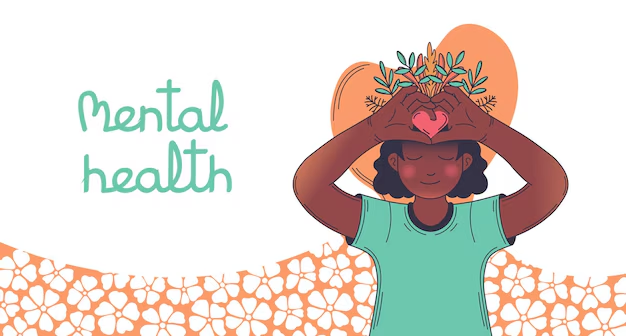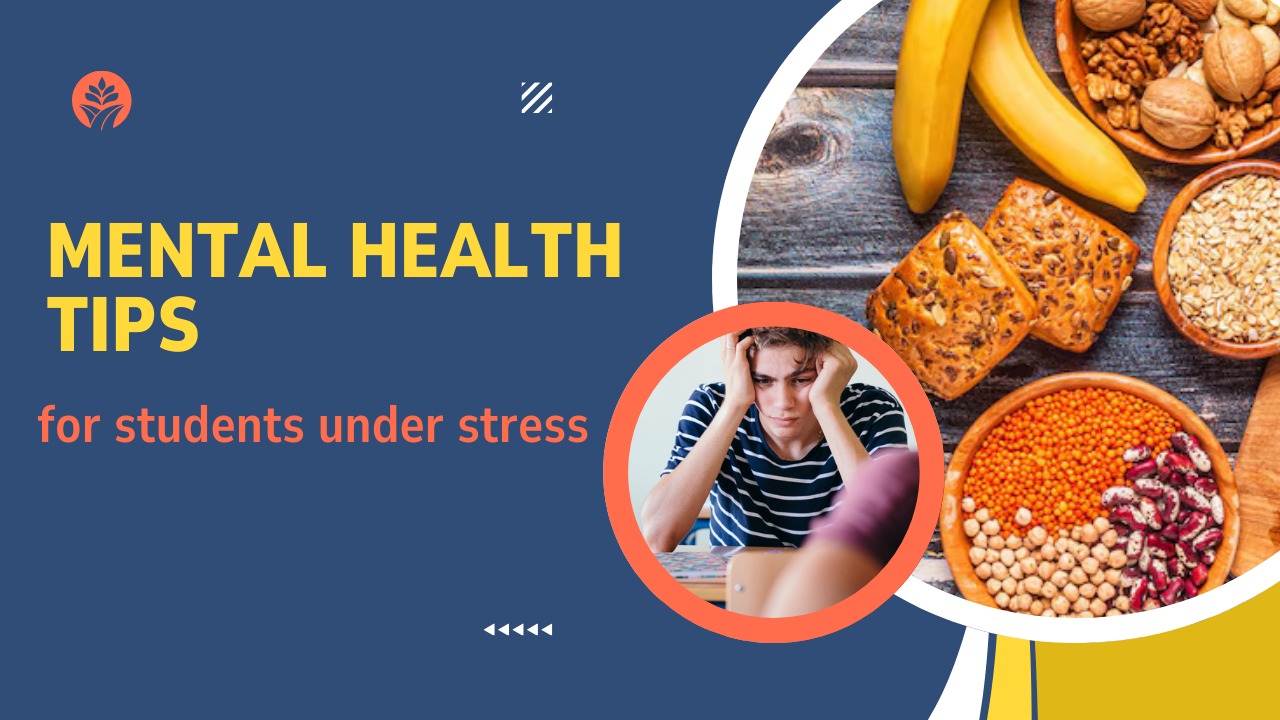Student health is becoming an increasingly important topic as academic pressure continues to rise. With tight deadlines, heavy coursework, and social expectations, students today face more emotional stress than ever before. Ignoring mental wellness can lead to anxiety, fatigue, depression, and reduced academic performance.
To combat this, students should adopt small but consistent habits that support emotional balance. Prioritizing sleep, taking regular screen breaks, eating nutritious meals, and practicing mindfulness or light physical activity can make a big difference. These simple mental health tips for students can help reduce stress and improve focus.
Mental wellness should not be overlooked or delayed. With the right tools and a supportive environment, students can thrive both academically and emotionally. Building a daily routine that includes mental health tips for students is one of the best ways to stay resilient and confident throughout the academic journey.
In this article, we’ll explore the top 8 mental health tips for students, offering in-depth, practical strategies to help maintain emotional well-being and foster a healthy mindset. Whether you’re in high school, college, or university, these tips can help you develop habits that promote mental resilience, focus, and overall happiness.

Why Mental Health Matters for Students
Mental health encompasses emotional, psychological, and social well-being. It shapes how individuals think, feel, and behave in everyday life. For students, maintaining good mental health is vital, as it directly impacts their ability to learn, concentrate, and manage academic and social responsibilities. A sound state of mind helps students stay resilient in the face of stress and adversity.
Students often face a variety of challenges, such as exam pressure, academic competition, time management issues, and social anxiety. These factors can lead to mental health concerns like anxiety, depression, or burnout if not properly addressed. That’s why incorporating mental health tips for students into their daily routine is essential.
Practices such as regular exercise, mindful breathing, setting realistic goals, and seeking help when needed can significantly improve a student’s mental state. Building strong relationships with peers, teachers, and counselors also offers emotional support and reduces feelings of isolation.
By adopting simple and practical mental health tips for students, young learners can build stronger coping mechanisms, improve their academic performance, and enhance overall well-being throughout their educational journey.
Some common mental health issues students face include:
Anxiety (exam stress, social anxiety, performance pressure)
Depression (persistent sadness, lack of interest, isolation)
Burnout (academic overload, exhaustion)
Sleep disturbances
Low self-esteem
Top Mental Health Tips for Students
Prioritize Self-Care and Healthy Routines
Self-care isn’t selfish—it’s essential for maintaining overall well-being, especially for students navigating a demanding academic environment. When you prioritize your mental and physical health, you’re better equipped to handle stress and stay focused on your goals. This mindset is one of the most valuable mental health tips for students to adopt early on.

Creating simple daily routines around sleep, nutrition, and hydration helps bring structure and stability. Going to bed at the same time each night, eating balanced meals, and drinking enough water can significantly improve mood, energy levels, and concentration. These small habits build a strong foundation for emotional resilience.
In addition to physical care, personal time is crucial. Set aside moments for hobbies, quiet reflection, or relaxation without guilt. These breaks recharge your mind and prevent burnout. Incorporating regular self-care into your lifestyle is not a luxury—it’s one of the most effective mental health tips for students aiming to thrive academically and emotionally.
What you can do:
Sleep 7–9 hours a night. Poor sleep increases stress, anxiety, and cognitive fatigue.
Eat balanced meals. Avoid excessive sugar, caffeine, or processed foods. Focus on brain-boosting nutrients (e.g., omega-3s, whole grains).
Stay hydrated. Dehydration can lead to fatigue, headaches, and irritability.
Take breaks. Short, frequent breaks while studying improve focus and prevent burnout.
📝 Pro Tip: Create a daily routine with fixed sleep/wake times and designated time blocks for studying, meals, and relaxation.
Manage Time Effectively
Poor time management is one of the leading causes of stress among students. When assignments accumulate and deadlines approach, it becomes easy to feel overwhelmed and anxious. This stress not only impacts academic performance but can also harm emotional well-being.
One of the most effective mental health tips for students is to adopt proper planning and organizational habits. Using a planner or digital calendar can help you map out tasks, break large projects into smaller steps, and allocate time for both study and rest. Prioritizing what’s most important ensures that urgent tasks don’t get buried under less critical ones.
What you can do:
Use planners or digital calendars (Google Calendar, Notion, Todoist).
Break down big tasks into smaller steps to avoid feeling overwhelmed.
Apply time-blocking: assign fixed time slots for each activity.
Avoid multitasking. Focus on one task at a time to boost productivity.
⏱️ Pro Tip: Try the Pomodoro Technique—25 minutes of focused work followed by a 5-minute break. It’s great for beating procrastination.
Stay Connected: Build Supportive Relationships
Loneliness and isolation are common challenges many students face, especially during transitions like starting college or moving to a new environment. Being physically surrounded by others doesn’t always guarantee emotional connection, and this disconnection can have serious effects on mental well-being. When students feel isolated, their risk for anxiety, depression, and academic burnout increases significantly.
One of the most powerful mental health tips for students is to actively seek and nurture social connections. This might mean joining a study group, participating in campus clubs, or simply reaching out to a friend or classmate for a chat. Even small interactions can create a sense of belonging and emotional safety.
Social support acts as a strong buffer against stress. When students have people to talk to and lean on, they’re more likely to feel understood and less overwhelmed by academic and personal pressures. Staying connected isn’t just helpful—it’s essential for maintaining strong mental health during student life.
What you can do:
Make time for friends and family, even during busy periods.
Join student clubs or interest groups to meet like-minded peers.
Talk to someone when you’re struggling—friends, mentors, or counselors.
Don’t be afraid to ask for help. You’re not alone.
🤝 Pro Tip: Regular check-ins with a trusted friend can help you stay emotionally grounded.
Exercise Regularly and Move Your Body
Physical activity isn’t just about staying fit—it plays a powerful role in supporting emotional and mental well-being. Regular exercise helps students manage stress, reduce anxiety, and improve mood by releasing endorphins, the body’s natural “feel-good” chemicals. It also lowers cortisol levels, which are associated with stress and tension.

One of the most important mental health tips for students is to include physical movement in their daily routine. This doesn’t mean intense workouts every day. Even a brisk 20-minute walk, light stretching, or a fun dance session can lift your mood and boost mental clarity. Consistent movement improves sleep, focus, and energy levels—all essential for academic success.
For students juggling tight schedules, finding time to move might seem difficult, but it’s worth the effort. Consider walking or biking to class, taking short movement breaks while studying, or joining a sports club. Small steps add up, and regular exercise can become a reliable tool for managing mental health effectively.
What you can do:
Aim for at least 30 minutes of activity 3–5 times a week.
Choose activities you enjoy—dancing, walking, yoga, gym workouts, swimming.
Use walking meetings or stretch breaks during study sessions.
Consider group sports to combine fitness with social interaction.
💪 Pro Tip: Even a 10-minute walk outdoors can significantly reduce stress and improve concentration.
Practice Mindfulness and Stress-Relief Techniques
Mindfulness is a powerful tool that encourages individuals to focus on the present moment without judgment. For students, who often juggle academic pressures, social expectations, and personal responsibilities, this practice can be especially beneficial. Mindfulness helps them become more aware of their thoughts and emotions, reducing unnecessary stress and worry.
One of the most effective mental health tips for students is to start the day with a few minutes of mindful breathing or meditation. This simple habit can increase concentration, improve emotional regulation, and foster a more positive mindset throughout the day. Even short breaks between study sessions to practice mindfulness can refresh the mind and prevent burnout.
Incorporating mindfulness into daily routines can also lead to long-term benefits such as better sleep, improved relationships, and increased resilience. By staying grounded in the present, students can navigate challenges more calmly and effectively, enhancing both academic performance and overall well-being.
What you can do:
Meditate for 5–10 minutes daily using apps like Headspace, Calm, or Insight Timer.
Practice deep breathing: inhale for 4 seconds, hold for 4, exhale for 6.
Write in a journal to process your emotions and thoughts.
Try gratitude journaling: list 3 things you’re thankful for daily.
🧘 Pro Tip: Start your morning with a 3-minute mindfulness session—it sets a positive tone for the day.
Limit Social Media and Screen Time
In today’s digital world, students rely heavily on screens for learning, socializing, and entertainment. While staying connected online is essential, too much screen time can negatively impact mental health. It often leads to overstimulation, reduced sleep quality, and increased feelings of anxiety or loneliness.
One of the most valuable mental health tips for students is to set boundaries with screen use. Creating tech-free times—especially before bed or during meals—can help students recharge and stay mentally balanced. Limiting social media use also reduces the tendency to compare oneself to others, which can be harmful to self-esteem.
Instead of constantly scrolling, students can engage in offline activities like reading, exercising, or spending time with friends and family. These alternatives promote relaxation and real-world connection, which are key to emotional wellness. By being mindful of screen habits, students can foster a healthier relationship with technology and improve their overall mental well-being.
What you can do:
Track your screen time using apps like Digital Wellbeing or Screen Time.
Set time limits for apps like Instagram, TikTok, or YouTube.
Unfollow or mute accounts that trigger negative thoughts or self-comparison.
Designate tech-free hours, especially before bed.
📵 Pro Tip: Replace some scrolling time with a non-digital activity—like reading, drawing, or walking outside.
Set Realistic Goals and Celebrate Small Wins
Many students struggle with the pressure to meet high expectations, whether set by themselves, parents, or society. Unrealistic goals can create a constant sense of failure and inadequacy, which negatively impacts mental health and self-worth. It’s important to recognize that perfection isn’t the goal—progress is.

One of the most practical mental health tips for students is to set achievable, realistic goals. Breaking down large tasks into smaller steps makes them more manageable and less overwhelming. Each small success builds confidence and motivation, helping students stay on track without feeling discouraged.
Acknowledging progress, no matter how small, reinforces a positive mindset. Celebrating little wins boosts morale and encourages students to keep moving forward. Instead of focusing only on outcomes, valuing effort and growth can lead to healthier self-esteem and greater emotional resilience. By adjusting expectations and embracing progress, students can thrive both academically and personally.
What you can do:
Set SMART goals (Specific, Measurable, Achievable, Relevant, Time-bound).
Break academic or personal goals into daily or weekly steps.
Celebrate milestones, even small ones—it builds confidence.
Practice self-compassion. Speak to yourself kindly, as you would to a friend.
🌱 Pro Tip: Keep a “Success Journal” where you track wins and lessons learned each week.
Seek Professional Help When Needed
Taking care of mental health isn’t always something you can do alone. Sometimes, the challenges students face—like academic stress, loneliness, or anxiety—can become too overwhelming to manage without help. Recognizing this is the first step toward real healing.
One of the most important mental health tips for students is to seek professional support when needed. Talking to a therapist or counselor provides a safe space to express emotions, gain perspective, and develop coping strategies. It’s not a sign of weakness but a sign of strength and self-awareness.
Therapy can empower students to better understand themselves and build emotional resilience. Whether dealing with daily stress or deeper issues, getting external support helps clear the mental fog and opens the door to personal growth. No one should feel ashamed to ask for help—mental health is just as important as physical health, and caring for it is a smart, courageous decision.
What you can do:
Use on-campus mental health resources. Most schools offer free or low-cost counseling.
Contact national helplines (e.g., Crisis Text Line, NAMI, or local services).
Talk to a doctor if you’re experiencing symptoms like ongoing sadness, panic attacks, or sleep disruptions.
Explore online therapy if you prefer virtual support.
🧠 Pro Tip: Don’t wait until you’re in crisis. Early support leads to better outcomes.
Signs Your Mental Health May Need Attention
Paying attention to early signs of mental health issues is essential for timely support and recovery. Here are some detailed indicators to watch out for:
Persistent Fatigue or Sleep Changes: Feeling tired all the time, even with enough rest, or experiencing insomnia or oversleeping may indicate emotional or mental strain.
Irritability or Mood Swings: Frequent mood changes, anger, or frustration without clear cause can be signs of stress, anxiety, or depression.
Withdrawal from Social Activities: Avoiding friends, family, or previously enjoyed activities may reflect emotional exhaustion or feelings of disconnection.
Lack of Interest or Motivation: Struggling to focus on studies or losing enthusiasm for hobbies and goals can signal underlying mental health concerns.
Panic Attacks or Excessive Worry: Intense fear, rapid heartbeat, or ongoing worry about daily tasks may suggest anxiety.
Difficulty Concentrating or Forgetfulness: Trouble remembering things or staying focused can be linked to mental fatigue or depression.
Feelings of Hopelessness or Worthlessness: Constant self-doubt, sadness, or the belief that nothing will improve is a critical warning sign needing immediate attention.
Mental health tips for students include talking to a counselor, maintaining a healthy routine, and reaching out for support when these signs appear. Early help leads to better outcomes.
How Parents and Educators Can Support Student Mental Health
Supporting students’ mental well-being starts at home and in the classroom. Here are key strategies parents and educators can follow:
Foster Open Communication: Create a safe and non-judgmental environment where students feel comfortable sharing their thoughts and feelings. Regular check-ins and active listening help build trust and emotional security.
Avoid Harsh Judgments or Excessive Pressure: Refrain from criticizing mistakes or pushing unrealistic expectations. Instead, focus on encouragement and support to help students grow without fear or shame.
Promote Healthy Routines and Life Balance: Encourage regular sleep, nutritious meals, physical activity, and time for relaxation. A balanced routine enhances both physical and emotional resilience—an essential mental health tip for students.
Watch for Warning Signs: Be observant of behavioral or emotional changes such as withdrawal, irritability, or lack of focus. Early recognition can lead to timely support and prevent further distress.
Guide Students to Professional Support: If a student is struggling, assist them in accessing school counselors, therapists, or mental health resources. Remind them that seeking help is a positive and brave step toward healing.
Conclusion
Taking care of your mental health as a student isn’t just about getting through the day—it’s about building a life where you can truly thrive. Academic pressure, deadlines, and social challenges are all part of student life, but they don’t have to take over your well-being. Learning how to manage stress, emotions, and expectations is a crucial part of success.

One of the best mental health tips for students is to create supportive daily habits. This includes setting boundaries with technology, maintaining a healthy sleep schedule, eating balanced meals, and finding time to relax. Small practices like meditation, breathing exercises, or writing in a journal can help you stay grounded and reduce anxiety.
Always remember: your mental health is just as vital as your physical health. Even the smallest action—like going for a five-minute walk, chatting with a friend, or practicing gratitude—can make a big difference. These small steps, repeated daily, lead to lasting personal growth and resilience.
FAQs
Q1. Why is mental health important for students ?
Mental health plays a critical role in a student’s ability to focus, learn, and succeed academically. Good emotional well-being supports better decision-making, stronger relationships, and a positive outlook on life. Prioritizing mental health tips for students helps them manage stress and stay motivated.
Q2. What are some daily mental health tips for students ?
Simple habits like getting enough sleep, staying physically active, eating nutritious meals, and practicing mindfulness can make a big difference. One of the most effective mental health tips for students is taking short breaks during study sessions to reset and relax.
Q3. How can students deal with academic stress ?
Breaking tasks into smaller steps, setting realistic goals, and using time management tools are key. Seeking support from teachers or counselors and using proven mental health tips for students like journaling or breathing exercises can also ease academic pressure.
Q4. When should a student seek professional help ?
If a student feels constantly overwhelmed, anxious, or depressed, it’s time to talk to a counselor or therapist. Following mental health tips for students is helpful, but professional support provides deeper guidance and care when needed.
Q5. How can parents and teachers support student mental health?
Creating a safe, understanding environment, listening without judgment, and encouraging healthy routines are essential. Sharing practical mental health tips for students and helping them access resources early can make a significant impact on their overall well-being.



